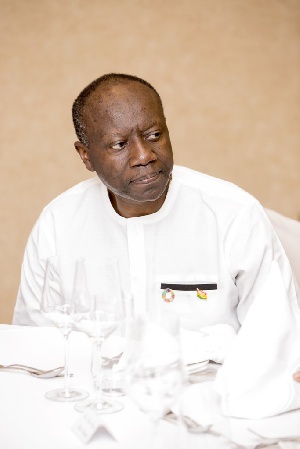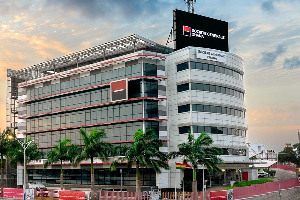- Home - News
- TWI News | TV
- Polls
- Year In Review
- News Archive
- Crime & Punishment
- Politics
- Regional
- Editorial
- Health
- Ghanaians Abroad
- Tabloid
- Africa
- Religion
- Election 2020
- Coronavirus
- News Videos | TV
- Photo Archives
- News Headlines
- Press Release
Business News of Wednesday, 1 April 2020
Source: thebusiness24online.net
Grim outlook as economy reels from shocks
Finance Minister Ken Ofori-Atta has painted a gloomy outlook for the Ghanaian economy, as the coronavirus pandemic wreaks havoc across both core and non-core sectors.
Addressing the legislature on Monday, he said the harsh impact of the coronavirus could have devastating effects on the local economy, with chances of eroding the economic gains that have so far been achieved.
“Preliminary analysis of the macro-fiscal impact of the pandemic shows that there is likely to be a significant slowdown in our GDP growth. The real GDP growth rate could decline from 6.8 per cent to 2.6 per cent with an outbreak and 1.5 per cent with a partial lockdown. Significant shortfalls in petroleum revenues, import duties and tax revenues, as well as increased health expenditures and tighter financing conditions, will have consequences on the 2020 budget.”
Mr. Ofori-Atta’s forecasts are grimmer than those put out in mid-March by the Bank of Ghana, which projected economic growth falling to 5 percent in the baseline scenario and to 2.5 percent in the worst-case scenario.
Key areas of the economy such as the manufacturing, pharmaceuticals, aviation, banking and hospitality sectors are currently experiencing the pain of the virus, with some suggesting they need a bailout from the government to survive and keep people in work.
The Finance Minister confirmed that the impact of the coronavirus on the Ghanaian economy has been diverse: from the employer who sees demand dropping drastically to the employee whose job and income are at risk.
The total estimated fiscal impact of the pandemic is GH?9.5 billion, which represents 2.5 percent of revised GDP. Overall, the crisis has opened up a budget financing gap of GH?11.4 billion, equivalent to 2.9 percent of revised GDP.
This, according to Mr. Ofori-Atta, includes the cost of shortfalls in petroleum receipts, import duties, tax revenues and the proposed stimulus package for small and medium businesses and households.
The stimulus package will provide at least GH?1 billion to support households and firms deal with the repercussions of the virus, which have been exacerbated by the partial lockdown imposed in four major metropolises of the country since Monday.
The harsh impact of the pandemic on the world economy is equally enormous, with the International Monetary Fund (IMF) predicting “a recession at least as bad as during the global financial crisis or worse”.
The United Nations Economic Commission for Africa (UNECA), meanwhile, sees Africa’s GDP growth dropping by 1.2 percentage points from 3.2 percent to 2 percent as a result of the pandemic.











